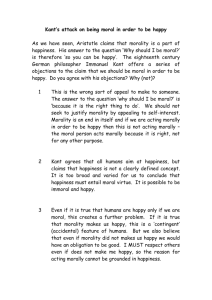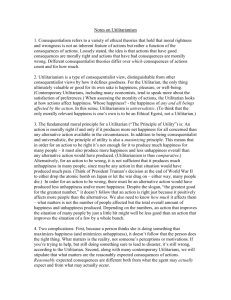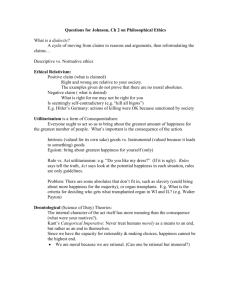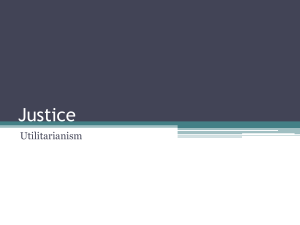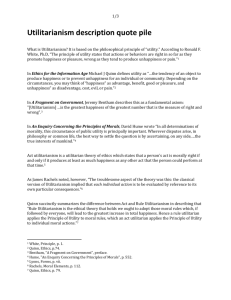Utilitarianism
advertisement
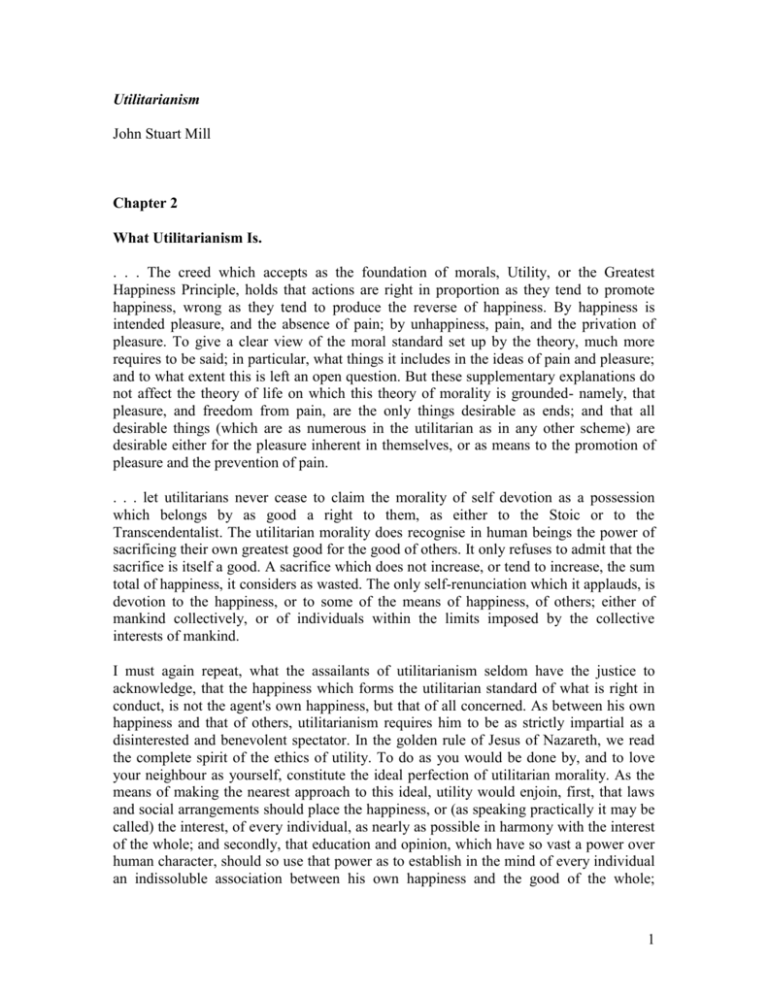
Utilitarianism John Stuart Mill Chapter 2 What Utilitarianism Is. . . . The creed which accepts as the foundation of morals, Utility, or the Greatest Happiness Principle, holds that actions are right in proportion as they tend to promote happiness, wrong as they tend to produce the reverse of happiness. By happiness is intended pleasure, and the absence of pain; by unhappiness, pain, and the privation of pleasure. To give a clear view of the moral standard set up by the theory, much more requires to be said; in particular, what things it includes in the ideas of pain and pleasure; and to what extent this is left an open question. But these supplementary explanations do not affect the theory of life on which this theory of morality is grounded- namely, that pleasure, and freedom from pain, are the only things desirable as ends; and that all desirable things (which are as numerous in the utilitarian as in any other scheme) are desirable either for the pleasure inherent in themselves, or as means to the promotion of pleasure and the prevention of pain. . . . let utilitarians never cease to claim the morality of self devotion as a possession which belongs by as good a right to them, as either to the Stoic or to the Transcendentalist. The utilitarian morality does recognise in human beings the power of sacrificing their own greatest good for the good of others. It only refuses to admit that the sacrifice is itself a good. A sacrifice which does not increase, or tend to increase, the sum total of happiness, it considers as wasted. The only self-renunciation which it applauds, is devotion to the happiness, or to some of the means of happiness, of others; either of mankind collectively, or of individuals within the limits imposed by the collective interests of mankind. I must again repeat, what the assailants of utilitarianism seldom have the justice to acknowledge, that the happiness which forms the utilitarian standard of what is right in conduct, is not the agent's own happiness, but that of all concerned. As between his own happiness and that of others, utilitarianism requires him to be as strictly impartial as a disinterested and benevolent spectator. In the golden rule of Jesus of Nazareth, we read the complete spirit of the ethics of utility. To do as you would be done by, and to love your neighbour as yourself, constitute the ideal perfection of utilitarian morality. As the means of making the nearest approach to this ideal, utility would enjoin, first, that laws and social arrangements should place the happiness, or (as speaking practically it may be called) the interest, of every individual, as nearly as possible in harmony with the interest of the whole; and secondly, that education and opinion, which have so vast a power over human character, should so use that power as to establish in the mind of every individual an indissoluble association between his own happiness and the good of the whole; 1 especially between his own happiness and the practice of such modes of conduct, negative and positive, as regard for the universal happiness prescribes; so that not only he may be unable to conceive the possibility of happiness to himself, consistently with conduct opposed to the general good, but also that a direct impulse to promote the general good may be in every individual one of the habitual motives of action, and the sentiments connected therewith may fill a large and prominent place in every human being's sentient existence. If the, impugners of the utilitarian morality represented it to their own minds in this its, true character, I know not what recommendation possessed by any other morality they could possibly affirm to be wanting to it; what more beautiful or more exalted developments of human nature any other ethical system can be supposed to foster, or what springs of action, not accessible to the utilitarian, such systems rely on for giving effect to their mandates. The objectors to utilitarianism cannot always be charged with representing it in a discreditable light. On the contrary, those among them who entertain anything like a just idea of its disinterested character, sometimes find fault with its standard as being too high for humanity. They say it is exacting too much to require that people shall always act from the inducement of promoting the general interests of society. But this is to mistake the very meaning of a standard of morals, and confound the rule of action with the motive of it. It is the business of ethics to tell us what are our duties, or by what test we may know them; but no system of ethics requires that the sole motive of all we do shall be a feeling of duty; on the contrary, ninety-nine hundredths of all our actions are done from other motives, and rightly so done, if the rule of duty does not condemn them. It is the more unjust to utilitarianism that this particular misapprehension should be made a ground of objection to it, inasmuch as utilitarian moralists have gone beyond almost all others in affirming that the motive has nothing to do with the morality of the action, though much with the worth of the agent. He who saves a fellow creature from drowning does what is morally right, whether his motive be duty, or the hope of being paid for his trouble; he who betrays the friend that trusts him, is guilty of a crime, even if his object be to serve another friend to whom he is under greater obligations. But to speak only of actions done from the motive of duty, and in direct obedience to principle: it is a misapprehension of the utilitarian mode of thought, to conceive it as implying that people should fix their minds upon so wide a generality as the world, or society at large. The great majority of good actions are intended not for the benefit of the world, but for that of individuals, of which the good of the world is made up; and the thoughts of the most virtuous man need not on these occasions travel beyond the particular persons concerned, except so far as is necessary to assure himself that in benefiting them he is not violating the rights, that is, the legitimate and authorised expectations, of any one else. The multiplication of happiness is, according to the utilitarian ethics, the object of virtue: the occasions on which any person (except one in a thousand) has it in his power to do this on an extended scale, in other words to be a public benefactor, are but exceptional; and on these occasions alone is he called on to consider public utility; in every other case, private utility, the interest or happiness of some few persons, is all he has to attend to. Those alone the influence of whose actions extends to society in general, need concern themselves habitually about large an object. In the case 2 of abstinences indeed- of things which people forbear to do from moral considerations, though the consequences in the particular case might be beneficial- it would be unworthy of an intelligent agent not to be consciously aware that the action is of a class which, if practised generally, would be generally injurious, and that this is the ground of the obligation to abstain from it. The amount of regard for the public interest implied in this recognition, is no greater than is demanded by every system of morals, for they all enjoin to abstain from whatever is manifestly pernicious to society. The same considerations dispose of another reproach against the doctrine of utility, founded on a still grosser misconception of the purpose of a standard of morality, and of the very meaning of the words right and wrong. It is often affirmed that utilitarianism renders men cold and unsympathising; that it chills their moral feelings towards individuals; that it makes them regard only the dry and hard consideration of the consequences of actions, not taking into their moral estimate the qualities from which those actions emanate. If the assertion means that they do not allow their judgment respecting the rightness or wrongness of an action to be influenced by their opinion of the qualities of the person who does it, this is a complaint not against utilitarianism, but against having any standard of morality at all; for certainly no known ethical standard decides an action to be good or bad because it is done by a good or a bad man, still less because done by an amiable, a brave, or a benevolent man, or the contrary. These considerations are relevant, not to the estimation of actions, but of persons; and there is nothing in the utilitarian theory inconsistent with the fact that there are other things which interest us in persons besides the rightness and wrongness of their actions. The Stoics, indeed, with the paradoxical misuse of language which was part of their system, and by which they strove to raise themselves above all concern about anything but virtue, were fond of saying that he who has that has everything; that he, and only he, is rich, is beautiful, is a king. But no claim of this description is made for the virtuous man by the utilitarian doctrine. Utilitarians are quite aware that there are other desirable possessions and qualities besides virtue, and are perfectly willing to allow to all of them their full worth. They are also aware that a right action does not necessarily indicate a virtuous character, and that actions which are blamable, often proceed from qualities entitled to praise. When this is apparent in any particular case, it modifies their estimation, not certainly of the act, but of the agent. I grant that they are, notwithstanding, of opinion, that in the long run the best proof of a good character is good actions; and resolutely refuse to consider any mental disposition as good, of which the predominant tendency is to produce bad conduct. This makes them unpopular with many people; but it is an unpopularity which they must share with every one who regards the distinction between right and wrong in a serious light; and the reproach is not one which a conscientious utilitarian need be anxious to repel. If no more be meant by the objection than that many utilitarians look on the morality of actions, as measured by the utilitarian standard, with too exclusive a regard, and do not lay sufficient stress upon the other beauties of character which go towards making a human being lovable or admirable, this may be admitted. Utilitarians who have cultivated their moral feelings, but not their sympathies nor their artistic perceptions, do fall into this mistake; and so do all other moralists under the same conditions. What can be said in 3 excuse for other moralists is equally available for them, namely, that, if there is to be any error, it is better that it should be on that side. As a matter of fact, we may affirm that among utilitarians as among adherents of other systems, there is every imaginable degree of rigidity and of laxity in the application of their standard: some are even puritanically rigorous, while others are as indulgent as can possibly be desired by sinner or by sentimentalist. But on the whole, a doctrine which brings prominently forward the interest that mankind have in the repression and prevention of conduct which violates the moral law, is likely to be inferior to no other in turning the sanctions of opinion again such violations. It is true, the question, What does violate the moral law? is one on which those who recognise different standards of morality are likely now and then to differ. But difference of opinion on moral questions was not first introduced into the world by utilitarianism, while that doctrine does supply, if not always an easy, at all events a tangible and intelligible mode of deciding such differences. It may not be superfluous to notice a few more of the common misapprehensions of utilitarian ethics, even those which are so obvious and gross that it might appear impossible for any person of candour and intelligence to fall into them; since persons, even of considerable mental endowments, often give themselves so little trouble to understand the bearings of any opinion against which they entertain a prejudice, and men are in general so little conscious of this voluntary ignorance as a defect, that the vulgarest misunderstandings of ethical doctrines are continually met with in the deliberate writings of persons of the greatest pretensions both to high principle and to philosophy. We not uncommonly hear the doctrine of utility inveighed against as a godless doctrine. If it be necessary to say anything at all against so mere an assumption, we may say that the question depends upon what idea we have formed of the moral character of the Deity. If it be a true belief that God desires, above all things, the happiness of his creatures, and that this was his purpose in their creation, utility is not only not a godless doctrine, but more profoundly religious than any other. If it be meant that utilitarianism does not recognise the revealed will of God as the supreme law of morals, I answer, that a utilitarian who believes in the perfect goodness and wisdom of God, necessarily believes that whatever God has thought fit to reveal on the subject of morals, must fulfil the requirements of utility in a supreme degree. But others besides utilitarians have been of opinion that the Christian revelation was intended, and is fitted, to inform the hearts and minds of mankind with a spirit which should enable them to find for themselves what is right, and incline them to do it when found, rather than to tell them, except in a very general way, what it is; and that we need a doctrine of ethics, carefully followed out, to interpret to us the will God. Whether this opinion is correct or not, it is superfluous here to discuss; since whatever aid religion, either natural or revealed, can afford to ethical investigation, is as open to the utilitarian moralist as to any other. He can use it as the testimony of God to the usefulness or hurtfulness of any given course of action, by as good a right as others can use it for the indication of a transcendental law, having no connection with usefulness or with happiness. Again, Utility is often summarily stigmatised as an immoral doctrine by giving it the name of Expediency, and taking advantage of the popular use of that term to contrast it with Principle. But the Expedient, in the sense in which it is opposed to the Right, 4 generally means that which is expedient for the particular interest of the agent himself; as when a minister sacrifices the interests of his country to keep himself in place. When it means anything better than this, it means that which is expedient for some immediate object, some temporary purpose, but which violates a rule whose observance is expedient in a much higher degree. The Expedient, in this sense, instead of being the same thing with the useful, is a branch of the hurtful. Thus, it would often be expedient, for the purpose of getting over some momentary embarrassment, or attaining some object immediately useful to ourselves or others, to tell a lie. But inasmuch as the cultivation in ourselves of a sensitive feeling on the subject of veracity, is one of the most useful, and the enfeeblement of that feeling one of the most hurtful, things to which our conduct can be instrumental; and inasmuch as any, even unintentional, deviation from truth, does that much towards weakening the trustworthiness of human assertion, which is not only the principal support of all present social well-being, but the insufficiency of which does more than any one thing that can be named to keep back civilisation, virtue, everything on which human happiness on the largest scale depends; we feel that the violation, for a present advantage, of a rule of such transcendant expediency, is not expedient, and that he who, for the sake of a convenience to himself or to some other individual, does what depends on him to deprive mankind of the good, and inflict upon them the evil, involved in the greater or less reliance which they can place in each other's word, acts the part of one of their worst enemies. Yet that even this rule, sacred as it is, admits of possible exceptions, is acknowledged by all moralists; the chief of which is when the withholding of some fact (as of information from a malefactor, or of bad news from a person dangerously ill) would save an individual (especially an individual other than oneself) from great and unmerited evil, and when the withholding can only be effected by denial. But in order that the exception may not extend itself beyond the need, and may have the least possible effect in weakening reliance on veracity, it ought to be recognised, and, if possible, its limits defined; and if the principle of utility is good for anything, it must be good for weighing these conflicting utilities against one another, and marking out the region within which one or the other preponderates. Again, defenders of utility often find themselves called upon to reply to such objections as this- that there is not time, previous to action, for calculating and weighing the effects of any line of conduct on the general happiness. This is exactly as if any one were to say that it is impossible to guide our conduct by Christianity, because there is not time, on every occasion on which anything has to be done, to read through the Old and New Testaments. The answer to the objection is, that there has been ample time, namely, the whole past duration of the human species. During all that time, mankind have been learning by experience the tendencies of actions; on which experience all the prudence, as well as all the morality of life, are dependent. People talk as if the commencement of this course of experience had hitherto been put off, and as if, at the moment when some man feels tempted to meddle with the property or life of another, he had to begin considering for the first time whether murder and theft are injurious to human happiness. Even then I do not think that he would find the question very puzzling; but, at all events, the matter is now done to his hand. 5 It is truly a whimsical supposition that, if mankind were agreed in considering utility to be the test of morality, they would remain without any agreement as to what is useful, and would take no measures for having their notions on the subject taught to the young, and enforced by law and opinion. There is no difficulty in proving any ethical standard whatever to work ill, if we suppose universal idiocy to be conjoined with it; but on any hypothesis short of that, mankind must by this time have acquired positive beliefs as to the effects of some actions on their happiness; and the beliefs which have thus come down are the rules of morality for the multitude, and for the philosopher until he has succeeded in finding better. That philosophers might easily do this, even now, on many subjects; that the received code of ethics is by no means of divine right; and that mankind have still much to learn as to the effects of actions on the general happiness, I admit, or rather, earnestly maintain. The corollaries from the principle of utility, like the precepts of every practical art, admit of indefinite improvement, and, in a progressive state of the human mind, their improvement is perpetually going on. But to consider the rules of morality as improvable, is one thing; to pass over the intermediate generalisations entirely, and endeavour to test each individual action directly by the first principle, is another. It is a strange notion that the acknowledgment of a first principle is inconsistent with the admission of secondary ones. To inform a traveller respecting the place of his. ultimate destination, is not to forbid the use of landmarks and direction-posts on the way. The proposition that happiness is the end and aim of morality, does not mean that no road ought to be laid down to that goal, or that persons going thither should not be advised to take one direction rather than another. Men really ought to leave off talking a kind of nonsense on this subject, which they would neither talk nor listen to on other matters of practical concernment. Nobody argues that the art of navigation is not founded on astronomy, because sailors cannot wait to calculate the Nautical Almanack. Being rational creatures, they go to sea with it ready calculated; and all rational creatures go out upon the sea of life with their minds made up on the common questions of right and wrong, as well as on many of the far more difficult questions of wise and foolish. And this, as long as foresight is a human quality, it is to be presumed they will continue to do. Whatever we adopt as the fundamental principle of morality, we require subordinate principles to apply it by; the impossibility of doing without them, being common to all systems, can afford no argument against any one in particular; but gravely to argue as if no such secondary principles could be had, and as if mankind had remained till now, and always must remain, without drawing any general conclusions from the experience of human life, is as high a pitch, I think, as absurdity has ever reached in philosophical controversy. The remainder of the stock arguments against utilitarianism mostly consist in laying to its charge the common infirmities of human nature, and the general difficulties which embarrass conscientious persons in shaping their course through life. We are told that a utilitarian will be apt to make his own particular case an exception to moral rules, and, when under temptation, will see a utility in the breach of a rule, greater than he will see in its observance. But is utility the only creed which is able to furnish us with excuses for evil doing, and means of cheating our own conscience? They are afforded in abundance by all doctrines which recognise as a fact in morals the existence of conflicting 6 considerations; which all doctrines do, that have been believed by sane persons. It is not the fault of any creed, but of the complicated nature of human affairs, that rules of conduct cannot be so framed as to require no exceptions, and that hardly any kind of action can safely be laid down as either always obligatory or always condemnable. There is no ethical creed which does not temper the rigidity of its laws, by giving a certain latitude, under the moral responsibility of the agent, for accommodation to peculiarities of circumstances; and under every creed, at the opening thus made, self-deception and dishonest casuistry get in. There exists no moral system under which there do not arise unequivocal cases of conflicting obligation. These are the real difficulties, the knotty points both in the theory of ethics, and in the conscientious guidance of personal conduct. They are overcome practically, with greater or with less success, according to the intellect and virtue of the individual; but it can hardly be pretended that any one will be the less qualified for dealing with them, from possessing an ultimate standard to which conflicting rights and duties can be referred. If utility is the ultimate source of moral obligations, utility may be invoked to decide between them when their demands are incompatible. Though the application of the standard may be difficult, it is better than none at all: while in other systems, the moral laws all claiming independent authority, there is no common umpire entitled to interfere between them; their claims to precedence one over another rest on little better than sophistry, and unless determined, as they generally are, by the unacknowledged influence of considerations of utility, afford a free scope for the action of personal desires and partialities. We must remember that only in these cases of conflict between secondary principles is it requisite that first principles should be appealed to. There is no case of moral obligation in which some secondary principle is not involved; and if only one, there can seldom be any real doubt which one it is, in the mind of any person by whom the principle itself is recognised. 7

